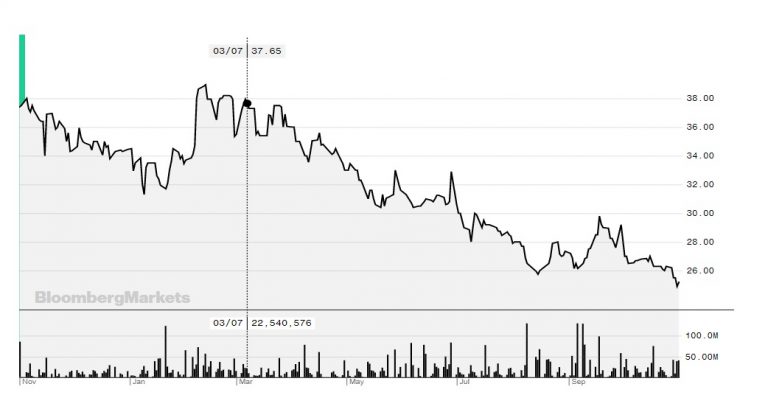
Let me address it here – yes, since the day MTN Nigeria sneezed that it would go “financial” after the Central Bank of Nigeria had postulated its upgraded financial inclusion strategy, most Nigerian banks have been losing market caps. While there are many factors that could have resulted to this precipitation, my conclusion is that markets are pricing a redesign in the financial sector. And most players believe MTN Nigeria MoMo product, on maturity, will trigger dislocations in the sector.
Our largest bank by market cap, GTBank, had fallen from N1.3 trillion to now N741 billion even in a time it has been declaring massive profits and growing revenues. Simply, there is no reason why that should happen. But it is happening due to market perceptions. Look at those numbers; it is only in Nigeria that a bank will deliver such, and yet nothing great happens on its stock (see the figure). Tell me, if massive profits do not deliver the glory of market cap bumps, what will?
The Bank’s balance sheet remained resilient with Total assets and Shareholders’ Funds closing at N3.519trillion and N636.8Billion respectively. Full Impact Capital Adequacy Ratio (CAR) remained very strong, closing at 23.6%. In terms of Assets quality, NPL ratio and Cost of Risk (COR) improved to 5.6% and 0.2% in September 2019 from 7.3% and 0.3% in December 2018 respectively. Complementing the improvement noted in NPLs and COR, we maintained adequate Loan Loss coverage of 95.2% for Lifetime Credit Impaired Loans (NPLs). On the backdrop of this result, Post-Tax Return on Equity (ROAE) closed at 32.3% while Post-Tax Return on Assets (ROAA) stood at 5.8%.
Commenting on the financial results, the Managing Director/CEO of Guaranty Trust Bank plc, Mr. Segun Agbaje, said; “The Bank’s 3rd quarter result reflects the strength of our franchise and the quality of our business strategy to deliver sustainable long-term value for our shareholders. Going into the final quarter of the year, we will continue to differentiate ourselves by maintaining a high standard in service delivery and leveraging our resources, expertise and network to enrich the lives of our customers. That’s why, from November 10 – 11, 2019, we are organizing the GTBank Fashion Weekend, the biggest consumer-focused event in Africa’s fashion industry, to give indigenous small businesses the platform and access to new markets and customers that they need to grow.”
Perception of markets – and you can blame MTN partly for that. Of course, this trajectory is not just on GTBank; other local banks are experiencing the same challenges.
Register for Tekedia Mini-MBA edition 19 (Feb 9 – May 2, 2026): big discounts for early bird.
Tekedia AI in Business Masterclass opens registrations.
Join Tekedia Capital Syndicate and co-invest in great global startups.
Register for Tekedia AI Lab: From Technical Design to Deployment (next edition begins Jan 24 2026).

---
Connect via my
LinkedIn |
Facebook |
X |
TikTok |
Instagram |
YouTube


In Nigeria, many things are dislocated or decoupled from conventional ways of understanding economics or economies; so our case is usually different.
When it comes to brand valuations, it’s very complicated here: from corporate governance to financial performances, they seem not have much weight when measured against what goes on in the capital market; it’s a broken system, perhaps.
Currently we are told that inflation is around 12%, from over 18% two years ago; but a bag of local rice goes for N18k – N20k right now, but the inflation is lowering…
There is a certain kind of paradoxes that usually play out here, where economic growth translates to more hunger, with more people falling under poverty line; nothing is normal here.
The same banks that declare huge profits still struggle to boast of decent market caps, perhaps market still believes that their futures aren’t assured, and therefore viewed them as being highly volatile.
Maybe there is an alternate reality in Nigeria.